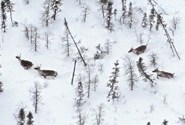
Caribou (Rangifer tarandus) is a species with demonstrated vulnerability to anthropogenic landscape change. The woodland caribou ecotype (Rangifer tarandus caribou) has experienced a 40% recession in its Ontario range over the past 150 years in tandem with industrial development. WCS Canada has been facilitating primary research and efforts to apply scientific information on this species to relevant policy and planning tables.
Caribou in the Hudson Bay Lowlands of Ontario
As an offshoot of the aerial surveys we completed in 2004, we re-evaluated caribou distribution and relative abundance patterns in the Hudson Plains Ecozone of Ontario. The previous findings, from a 1960’s paper, appeared in Rangifer in 2005.
To determine past distribution and relative abundance of caribou in the region, we reviewed past winter systematic aerial surveys, partial winter systematic surveys, summer photographic surveys, incidental observations of caribou, and other sources of information from the period 1950-2003. We then combined and compared these data with caribou-specific results from our 2003-4 aerial surveys.
From this information, we defined nine core wintering areas in the Hudson Bay Lowlands and differentiated between three categories of relative abundance.
- Wintering areas for the January-March period have changed relatively little over the past 45 years.
- Summer distribution of caribou along the Hudson Bay coast apparently shifted or expanded from the area west of the Severn River to the central and eastern portions of the coast since the 1980’s,
- Caribou observations have become much more common in the area east of the Winisk River since 1998.
Because major resource development activities in the HPE are proposed and some are imminent, we recommended additional caribou surveys to document current caribou population identity, size, and distribution, and more research projects to better define caribou wintering areas, calving areas and movement patterns in the Hudson Plains Ecozone.
Woodland Caribou Expert Workshop

A workshop, organized by WCS Canada and the Canadian Boreal Initiative, was held February 28 and March 1, 2006 at the University of Ottawa and focused specifically on the habitat needs of woodland caribou.
The goal of the gathering was to explore how much consensus there is among caribou scientists about ‘what is and what is not’ caribou habitat, and what were the parameters or thresholds for maintaining sufficient woodland caribou habitat in the face of large-scale anthropogenic disturbances.
Presently, there is much focus on woodland caribou conservation through the twin vehicles of land use planning (occurring at various scales across the country) and species recovery planning. Therefore, it is an important time for scientists with caribou expertise to contribute to these important conservation decisions.
Workshop participants considered how current knowledge might inform woodland caribou conservation and management processes. Limits in current knowledge were also identified and used to develop a future research agenda.
Publications
Magoun, A.J., K. F. Abraham, J. E. Thompson, J.C. Ray, M.E. Gauthier, G. Brown, G. Woolmer, C. Chenier, and N. Dawson. 2005. Distribution and relative abundance of caribou in the Hudson Bay Lowland of Ontario. Rangifer